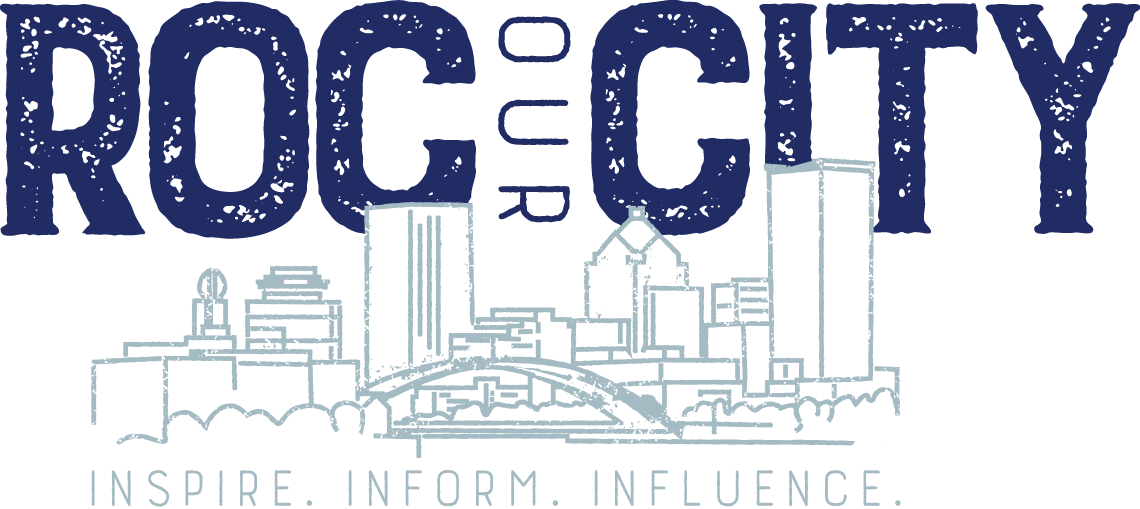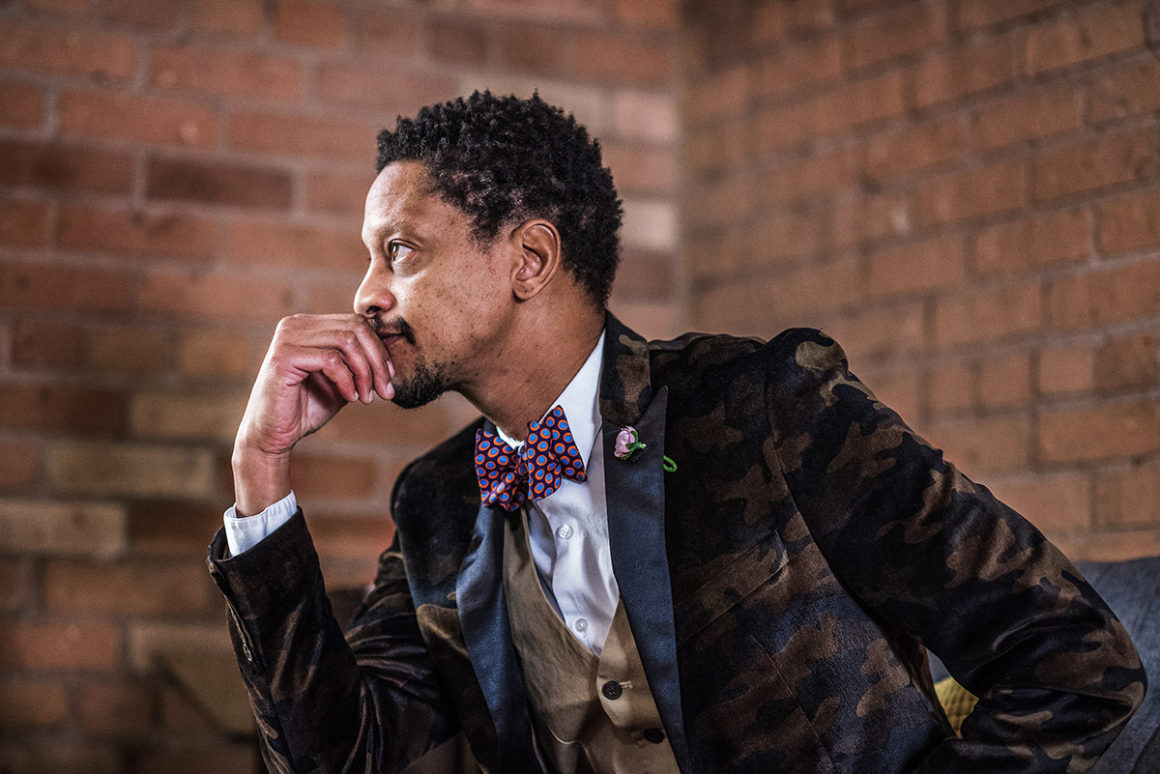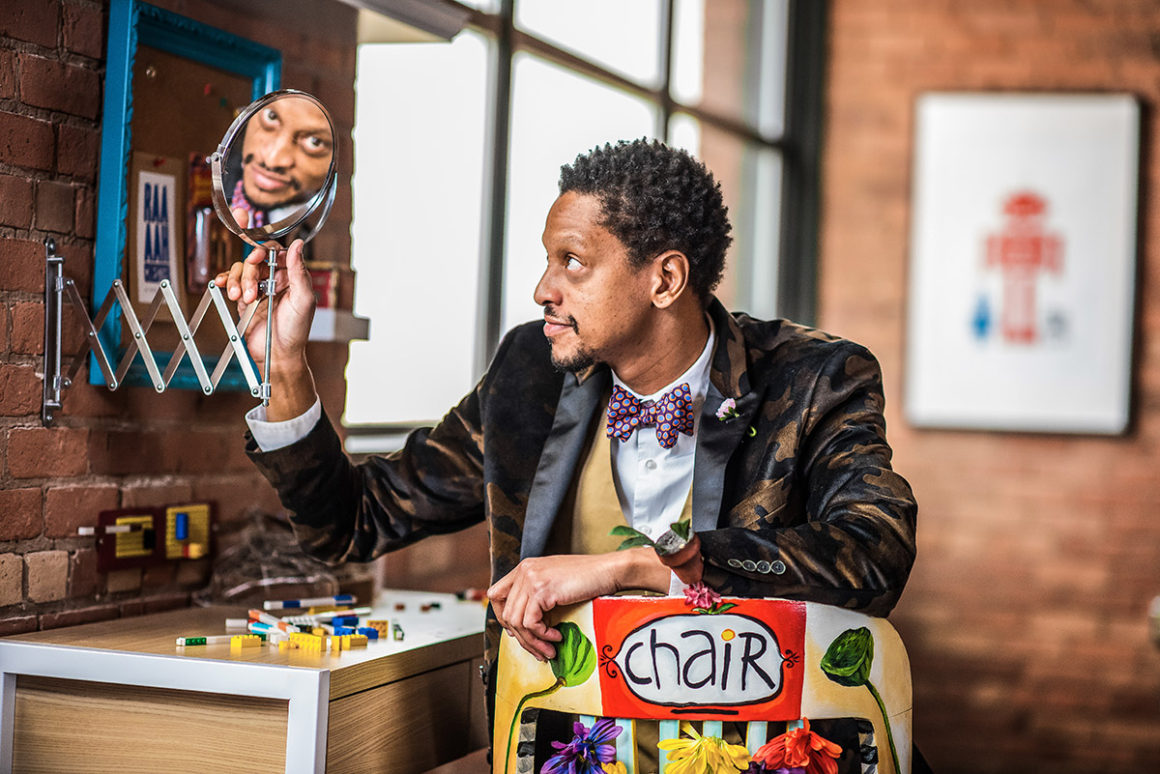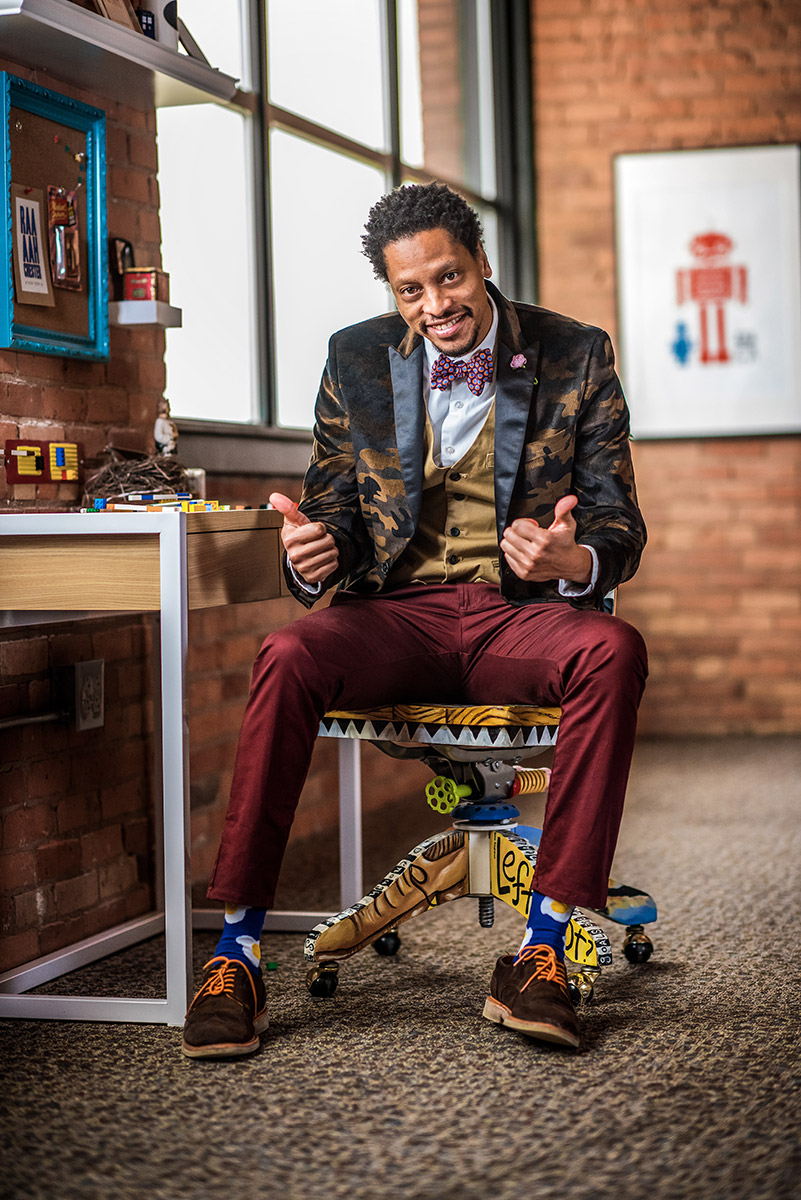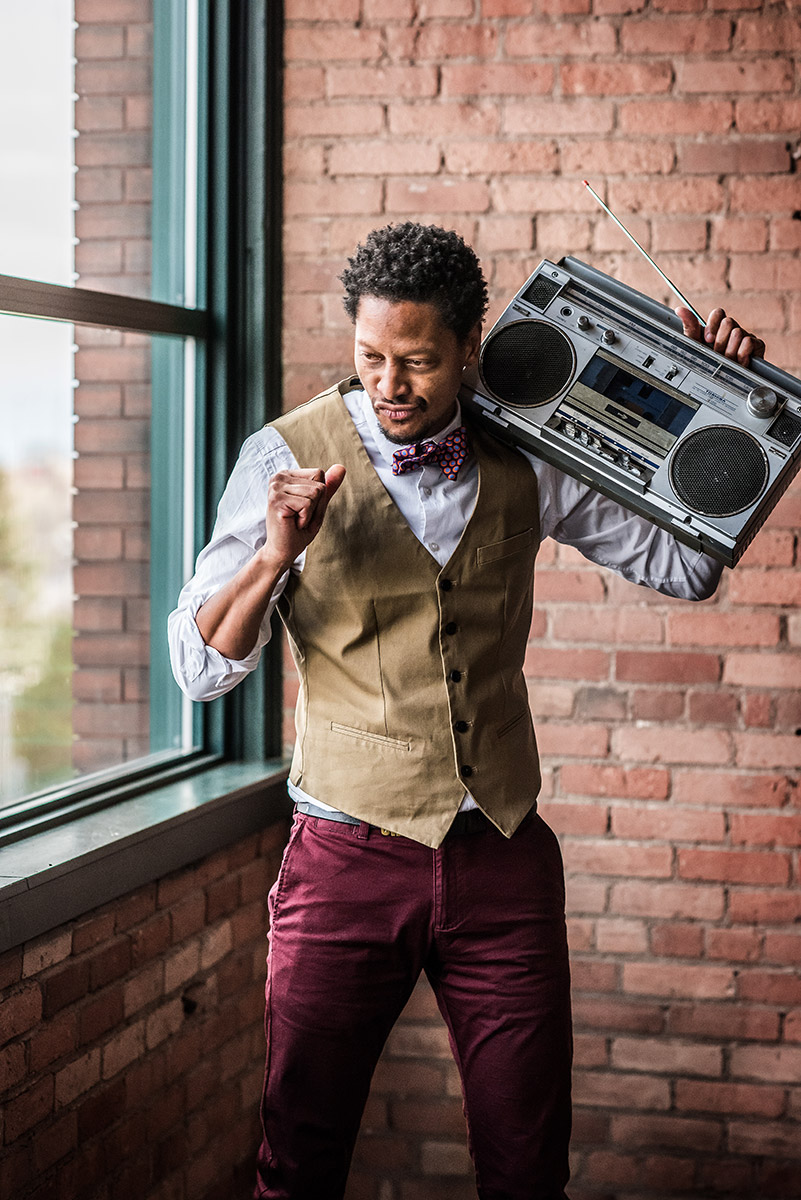Name: Shawn Dunwoody
Profession: Artist and Educator
Title: Visual Consultant and Owner of Dunwoode Design
Location: Outfit Collective
Interview: John Loury & Michael Sutton Photography: Rich Brainerd
1. What life events have had the greatest impact on who you are today?
There have been so many life events… the birth of children… the first time I discovered art… becoming a grandpa… there are too many to mention. I would also have to say the small experiences, like when I was younger people just saying “you can do it” and having a few moments in the sun to think.
2. How do you define success? And what metrics do you use to confirm it?
I feel success is relative to what you may be looking for at that very moment. When I was 6, success was riding without training wheels, when I was 11 it was kissing a girl, and at 43 it’s the ability to wake up and affect someone’s life for even just a second with a kind word or piece of art. I use a smile on someone’s face, a young person’s dream fulfilled, or a small smile on my face as a metric to immediate success.
3. Where do you draw inspiration from?
I draw inspiration from everyone around me. I believe there is light to be found in everyone.
4. What is it about your approach that is unique or separates you from others?
I’m not sure I have a unique approach. I just approach things.
5. How do you use information (data) to make decisions related to your profession or craft?
I use data to find new trends, research a subject, design ideas, and connect with new clients.
6. What does being a Rochesterian mean to you?*
It means being creative, innovative, and a thought-provoking individual. Our city, even before it was called Rochester, was established by people who were creators, innovators, and thought provocateurs. They were trying to get people to think differently. So if we go back to the suffrage movement, abolition movement, the forty-hour work week, they all have roots here. There are so many things that are so powerful here that we are so keen about. Geographically, we have two waterfalls and two gorges as well.
Rochester is about building and shaping the world. Up until Slumdog Millionaire, we helped move societies, cultures and ideas about people because of the film industry. And it came from one person’s idea to build a bit more on film itself and expand that in the 1950s through Kodak.
There are so many thinkers, and I think that being a Rochesterian is about moving forward. It is never about being stagnant. If we look at the shape of our city—the physical form—it’s always moving. This means that we have a river running through our city that is always shaping its physical environment. Every little micrometer is being shaped, and that river tells us every day to keep moving and keep pushing forward. Change things, make a difference, and make it happen. That’s what being a Rochesterian means to me.
7. What are the greatest challenges Rochester faces in terms of future growth and success?*
Collaboration, education, and vision.
Everyone is on this anti-poverty movement and trying to change the tide of things. But if we are not collaborating, not reaching across tables, and not looking past being a Democrat, Republican, black, white, gay, straight, Catholic, Jewish, then we are lost. We have to be able to cross those boundaries together for the benefit of everyone. I believe that is the first part of tipping the scales of this city. Our forefathers and foremothers like Frederick Douglass and Susan B. Anthony thought about working together, i.e., collaborating. But over time and because of ideas, they split, because black men should get it first or women should get it first, they split. Let’s cross the river every once in a while. Every side of the track is not necessarily scary, and we need to understand that. We always act as if Rochester is one of the poorest cities in the country with a high crime rate, but within that crime and poverty there is great creativity. And I do not think that people understand that. When you talk to elderly immigrants, they tell a story of when they arrived and the poverty they faced, but they had each other, they worked together, and made great things happen.
Education is important for cross-collaboration, learning about other cultures, and all ages and races understanding one another. Learning about science, math, and writing is also essential. Self-actualization and getting a basic sense of who you are and where you fit in the world must also be learned. With what we have and obtain, we can see and understand who we are and how we can shape ourselves and others. That was a part of my own upbringing. I grew up in the Crescent and still push forward because it is who I am. When I was in school, people told me I was something, I could achieve something, and I could make it happen regardless of my circumstances. Today, everybody talks about downtown revitalization, building up downtown, and everybody gets hot about young professionals. We are all about the young and engaged people, but once these young professionals, whoever they may be, want to start a family, they move the hell out of here because the school system sucks. And that is the elephant in the room. We cannot move forward unless we fix our schools and education system. And I don’t know how we will tackle this.
We can attach ourselves to a vision, these renaissance-type plans. If we all say to every group—the teachers’ union, city organizations, city council leaders—here is our overarching vision of what we see and we would like to have, then we can splinter off and everyone can take a mission and we can make it all move forward and shape and impact people. I just had an interview with Andy Bewley, who heads up the Department of Positivity project. There are so many people who are trying to do things and create these bubbles of light in this community. Do we want our city to be the best city for education, arts and culture, or technology? What do we want to be and how do we make that happen? We are all in this together, but if we have that vision together, then we have a damn good city on our hands.
8. If you were to film a movie about your life, what actor would you cast to play yourself?
Good question! It all depends on what stage of life we are talking about. Am I going to be a kid first or am I just going straight into adulthood or am I just an old man? All things considered, I would like to have Will Smith play me. I like his personal story and the movement of his life: his early stages of hip hop and his kiddy raps, which everyone still really loves, to becoming this movie star action hero. Everybody can hum the Fresh Prince of Bel-Air song! I just love his movement and personal growth. He takes what he’s learned in this area and that area and moves it to this point in his life and then moves it to the next point in his life. And that is why I enjoy his characters.
This relates to me because I have worn many hats and have taken from one area and questioned how I should apply it. I have grown up being one of the statistics that creates the poverty level and being a teenage dad with no education while being on social service. I was the poster child. But with the understanding of what people told me I could accomplish, I drew from that arena. Many people call me an activist, an “artivist,” an agent for change, but it came together from smaller pieces of my life to piece together right now. But that will change? That is where I find value and a connection with Will.
As an older version of me, I would like it to be someone young like me but with a lot of makeup on, someone like Jamie Foxx. He started off with impersonations, someone who dressed up as a comedian. He is actually a trained pianist. He went through different stages. I enjoy Jim Carrey. He might play a cameo as me. These people have transformed their lives—people like Tom Hanks, people who are phenomenal. You don’t even consider them as funny guys, but as serious actors. You take them seriously when they say something.
9. Do you have any nominations of individuals who ROC Our City?
Jason and Stefanie Schwingle, co-founders of the Rochesteriat.
Adrian Elim, who runs the Building Leadership and Community Knowledge (BLACK) Organization. They are committed to moving the cause of young African Americans who are here in town. He not only protests but he also protects. He educates and tutors young people, and volunteers in food programs.
Sarah Knight of Rock Girl Gang, doing fantastic stuff.
Daniel Schneiderman, in the Makers movement, is moving things forward. He was at the White House this summer. He is working on a big project that is uniting Makers throughout the city, and I really admire him. He helped redefine myself. I was also a part of Maker Fair he put on where the focus was not only about creating innovation but also about making community.
What do you want people to know about you and about Rochester?
Right now, I do what I do because I want to be what I wanted to see when I was younger. Because of what I could not see. Looking at the future, our forefathers and foremothers held a vision. Young kids should know that they can change what is around them.
I would like people to know Rochester is about change and moving forward, and Rochester is a city that looks to the future and we plan now for what we will build later. And that connects to the originators of this city and what we want to move forward with. We would never have seen Hillary Clinton run for president in the past… that means we are moving forward. Rochester is moving forward. We don’t try to forget our past; we are always looking to the future. If we look too much in our rearview mirror to see what is behind us, then we cannot see what is in front of us. So we are drawing from our past but we are always looking to the future… that is what Rochester does.
